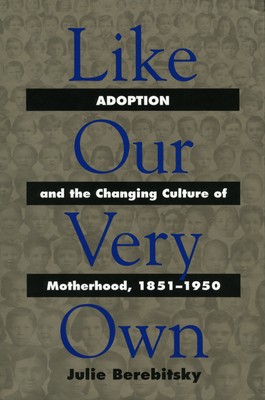
- We will send in 10–14 business days.
- Author: Julie Berebitsky
- Publisher: University Press Of Kansas
- ISBN-10: 0700610510
- ISBN-13: 9780700610518
- Format: 15.2 x 22.9 x 1.9 cm, hardcover
- Language: English
- SAVE -10% with code: EXTRA
Reviews
Description
Talk about adoption has become increasingly politicized, as debates swirl around the morality and viability of various forms of adoption: interracial, international, open, and those involving single parents or gay and lesbian couples. Paramount in many minds is the threat to the traditional (or mythical) nuclear family. But, as Julie Berebitsky shows, such concerns are fairly recent developments in the history of adoption.
Berebitsky reveals that in the late nineteenth and early twentieth centuries the rules governing adoption were much less rigid and adoptive parents and families were considerably more diverse. In Like Our Very Own, she chronicles the experiences of adoptive parents and children during a century of great change, illuminating the prominent role adoption came to play in defining both motherhood and family in America. Drawing on case histories, letters from adoptive parents, congressional records, and fiction and popular magazines of the day, Berebitsky recovers the efforts of single women, African Americans, the elderly, and other marginalized citizens to obtain children of their own. She contends, however, that this diversity gradually diminished during the hundred years between the first adoption laws in 1851 and the postwar baby boom era. Adoption social theory and practice was gradually transformed into a highly homogenized model that tried to match children to parents by class and background and that ultimately favored conventional middle class American families. Changing attitudes about adoption, as Berebitsky shows, have also mirrored changing definitions of motherhood. At a time when womanhood and motherhood were socially synonymous, both birth mothers who gave up their children and adoptive mothers seeking a maternal role were viewed as transgressors of the natural order. This eventually changed, but only after proper training and outside expert approval replaced an assumed maternal instinct as the keystone of good mothering., br>A fascinating chapter in American social and cultural history, Like Our Very Own offers compelling evidence that adoption has always been an important factor in our evolving efforts to define the meaning and nature of both motherhood and family.
EXTRA 10 % discount with code: EXTRA
The promotion ends in 17d.21:37:29
The discount code is valid when purchasing from 10 €. Discounts do not stack.
- Author: Julie Berebitsky
- Publisher: University Press Of Kansas
- ISBN-10: 0700610510
- ISBN-13: 9780700610518
- Format: 15.2 x 22.9 x 1.9 cm, hardcover
- Language: English English
Talk about adoption has become increasingly politicized, as debates swirl around the morality and viability of various forms of adoption: interracial, international, open, and those involving single parents or gay and lesbian couples. Paramount in many minds is the threat to the traditional (or mythical) nuclear family. But, as Julie Berebitsky shows, such concerns are fairly recent developments in the history of adoption.
Berebitsky reveals that in the late nineteenth and early twentieth centuries the rules governing adoption were much less rigid and adoptive parents and families were considerably more diverse. In Like Our Very Own, she chronicles the experiences of adoptive parents and children during a century of great change, illuminating the prominent role adoption came to play in defining both motherhood and family in America. Drawing on case histories, letters from adoptive parents, congressional records, and fiction and popular magazines of the day, Berebitsky recovers the efforts of single women, African Americans, the elderly, and other marginalized citizens to obtain children of their own. She contends, however, that this diversity gradually diminished during the hundred years between the first adoption laws in 1851 and the postwar baby boom era. Adoption social theory and practice was gradually transformed into a highly homogenized model that tried to match children to parents by class and background and that ultimately favored conventional middle class American families. Changing attitudes about adoption, as Berebitsky shows, have also mirrored changing definitions of motherhood. At a time when womanhood and motherhood were socially synonymous, both birth mothers who gave up their children and adoptive mothers seeking a maternal role were viewed as transgressors of the natural order. This eventually changed, but only after proper training and outside expert approval replaced an assumed maternal instinct as the keystone of good mothering., br>A fascinating chapter in American social and cultural history, Like Our Very Own offers compelling evidence that adoption has always been an important factor in our evolving efforts to define the meaning and nature of both motherhood and family.


Reviews